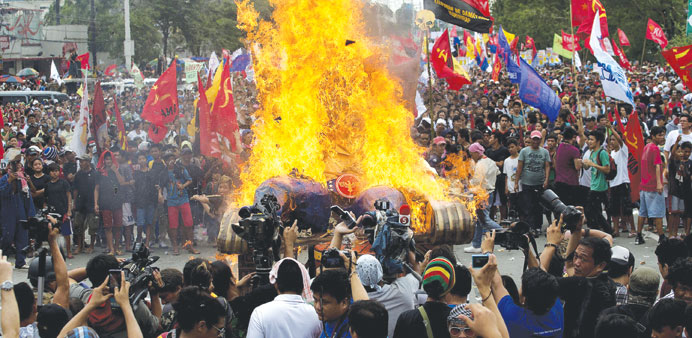Reuters/Manila
Philippine President Benigno Aquino called on the nation yesterday to support his reforms as he faced the biggest political crisis in his four years in power, a spending scandal that could damage his anti-graft image and undermine reforms.
The Supreme Court this month declared partly illegal a 145bn pesos ($3.34bn) economic stimulus fund that Aquino created in 2011 from budget savings, sparking a storm of controversy that put into doubt his commitment to fighting corruption.
Yesterday, Aquino, in his second-to-last State of the Nation Address, listed his administration’s successes in areas such as infrastructure development, military modernisation, and reforms to stamp out corruption in revenue agencies.
“This is the result of reforms, and this is what we fought for and continue to fight for, not the continuation of the status quo, but change in the system for everyone’s benefit,” he said in his televised address.
Economists are concerned the controversy over the Supreme Court’s ruling is slowing public spending because officials are more wary about accusations of recklessness and are subjecting decisions to more scrutiny, putting at risk big infrastructure projects. The IMF on Friday cut its Philippine growth forecast to 6.2% from 6.5% set in March, partly because of slower spending after the stimulus scandal broke. The government has set a target of 6.5 to 7.5% gross domestic product growth this year, after 7.2% last year.
Two impeachment complaints related to the stimulus funds have been filed against Aquino in recent weeks, accusing him of betraying public trust and violating the constitution following the court’s ruling.
Aquino won the presidency in 2010 on a promise of good governance and fighting graft but has struggled to rid the country of its image as one of the most corrupt in Asia.
He became emotional in the last few minutes of his speech as he recalled that the reason why he ran for president was to continue the fight of his parents: an assassinated opponent of dictatorship and a democracy hero who became the country’s first woman president.
“You gave me the opportunity to lead a transformation. If I declined the challenge that you presented, it would be like saying I would support your continued suffering, and my conscience cannot take that,” he said.
Prospero de Vera, public administration professor at the University of the Philippines, said Aquino was trying to reassert his embattled administration.
“The only way of reasserting yourself is to go back to your natural constituencies and get back the support that you had before,” he said.
Under the stimulus facility, Aquino spent funds saved from cancelled projects on housing and relocation of slum residents, radars for the weather bureau and infusing capital to the central bank to help it with its market intervention, among other activities.
A portion of the funds was distributed to senators to use on projects of their choice.
The Supreme Court agreed the stimulus helped lift the economy, but said aspects of it were unconstitutional. It did not call any actions criminal, though lawyers say the ruling could open the way for complaints alleging wrongdoing.
Critics said the allocation of funds to senators for their projects cast doubt on Aquino’s commitment to stamp out corruption. And the controversy is having an impact on how officials proceed, raising some risks for the economy.
“If this leads to a slowdown in spending, the risk to growth is on the downside,” Shanaka Jayanath Peiris, International Monetary Fund resident representative in the Philippines, said on Friday, referring to the scandal.
The government will propose a supplemental budget for 2014 to ensure there is no delay in projects after the scrapping of the stimulus fund, Aquino said. The government has not determined its size.
Outside Congress, about 5,000 protesters, most of them left-wing activists, burned an effigy of Aquino as he delivered his speech. Police used water cannons to prevent protesters from breaching barricades.

Anti-government protesters burn an effigy representing Philippine President Benigno Aquino during a protest in Manila yesterday, to coincide with Aqui
